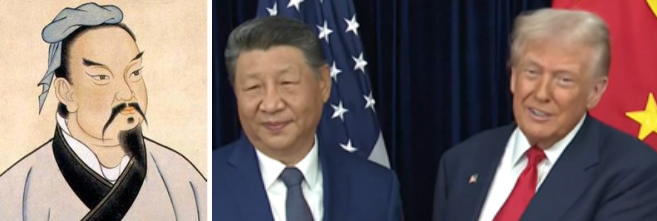 [1]
[1]
By John Helmer, Moscow
@bears_with [2]
In a conversation lasting one hour and forty minutes according to the Chinese stopwatch– “a long meeting” on President Donald Trump’s clock [3] — President Xi Jinping first knocked the stuffing out of Trump’s warmaking threats, then forced him to beat a retreat behind a 12-month ceasefire with the man the Pentagon has designated its principal enemy but whom Trump praised effusively as “a great leader, great leader of a very powerful, very strong country…a tremendous leader of a very powerful country and I give great respect to him [3].”
“Uh,” Trump told reporters on board his aircraft as it rocked in crosswinds flying eastward, “a lot of things we discussed in great detail. A lot of things we brought to finalization. A lot of finalization.” This was false. [3]
Worse for the Trump warfighting strategy, the Chinese have retained escalation dominance by making Trump’s concessions their pre-condition for China’s temporary suspension of their sanctions on rare earths exports and imports of US computer chips [4]. For this, Xi offered to buy US soybeans slowly for $34.2 billion over four years – roughly half in tonnage, half in price over twice the interval that China had agreed to in the past [5].
In General Sun Tzu’s ancient manual for warfighting [6], “the supreme art of war is to subdue the enemy without fighting”. The old man also confessed his limitation: “there is an intelligent way to eat a live frog – I just don’t know what it is.” Xi just demonstrated the way to do it. Trump went down smiling.
Xi has not yet telephoned President Vladimir Putin to brief him on what happened. After Putin’s meeting with Trump in Alaska on August 6, Putin telephoned Xi on August 8 [7]. “So far,” said [8] Putin’s spokesman Dmitry Peskov, ”there is no such conversation in the schedule, but it can be quickly agreed upon if necessary,”
The Russian state media have interpreted the outcome of the talks to be a “temporary ceasefire” achieved by not discussing the key economic and territorial war issues at all. “There have been no joint statements yet,” Tass noted [9], “and some of the most important issues of bilateral relations, such as Nvidia chips and advanced products, have remained unresolved.” Nothing was achieved, the official Moscow commentators think, in the US attempt to split Xi from Putin, and secure Chinese pressure on Russia to end the Ukraine war on US and NATO terms. “Ukraine came up, uh, very strongly,” Trump told [3] reporters as he flew back to Washington. “We talked about it for a long time and we’re both gonna work together to see if we can get something done. Uh, we agreed the, the sides there, you know, locked in, fighting, and sometimes you have to let him fight, I guess. Crazy. But he’s gonna help us and we’re gonna work together on Ukraine.”
The Russian state media have yet to notice that Trump is abandoning his attempt, through the Rosneft and LUKOil oil trade sanctions of October 25 [10], to stop China buying Russian oil. “There’s not a lot more we can do,” Trump replied to a reporter who asked if he and Xi had discussed his threat to sanction Chinese companies for buying Russian crude oil and petroleum products. “Uh, you know, he’s been buying oil from Russia for a long time. It takes care of a, a big part of China. And, you know, I, I can say India’s been very good, good on that, uh, front. Uh, but, uh, we, we didn’t really discuss the oil. We discussed working together to see if we could get that war finished. You know, it doesn’t affect China [3].”
A review of the Xi-Trump summit by Russian sources has identified Xi’s ten noes as a discreet way of contrasting Putin’s approach with Trump at the Anchorage meeting, their subsequent telephone call, and the exchange of remarks about each other in the press:
Tsargrad, the television and internet medium of Russian nationalism, has been the least reticent of the Moscow media in its summing up. “After a triumphant – in words – visit to Japan, which refused to stop buying Russian oil, and the ‘bummer’ (облома) in South Korea, which will not invest $ 350 billion in the US economy if they themselves do not give this amount to Seoul, Trump met with Xi Jinping in Busan. And he lost a big one. Negotiations at the South Korean Air Force base lasted 1 hour and 40 minutes, after which, shaking hands, the leaders went off on their own business. As a result, ‘the fantastic relationships for a long time’ (Trump’s words) turned out to be a dream [11].”
The lesson for the Kremlin, Tsargrad [11] hinted, was that “when Trump flew away from Busan, it was clear that he was lost, because the US could not intimidate China like other countries…Equally obvious, the victory of one of the two contenders for the title of the leading power of the world will depend on the position of Russia. The global geopolitical triangle has not gone away – only the weight and degree of influence of its member countries changes. Half a century ago, Beijing had the ‘golden [controlling] share’, but now Moscow has it — and it also has the ‘silver bullet’ ”.